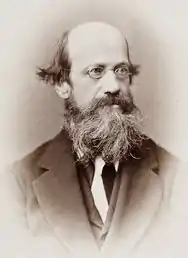Joseph Lovering | |
|---|---|
 Lovering circa 1868–1875 | |
| Born | 25 December 1813 |
| Died | 18 January 1892 Boston, Massachusetts |
| Nationality | American |
| Alma mater | Harvard University (A.B., 1833) |
| Scientific career | |
| Fields | Mathematics |
| Institutions | Harvard University |
| Academic advisors | Benjamin Peirce |
| Doctoral students | John Trowbridge |
Joseph Lovering (25 December 1813 – 18 January 1892) was an American scientist and educator.
Biography
Lovering graduated from Harvard in 1833. In 1838, he was named Hollis Professor of mathematics and natural philosophy in Harvard. He held this chair until 1888, when he was appointed Professor Emeritus, after 50 years service. He was acting regent of the university (1853–1854) and succeeded Felton as regent.
He was director of Jefferson Physical Laboratory from 1884 to 1888, and was associated with the Harvard College Observatory, especially in the joint observations of the United States and the London Royal Society on terrestrial magnetism.
From 1869 to 1873 he served as corresponding secretary, from 1873 to 1880 vice president, and from 1880 to 1881 president of the American Association for the Advancement of Science.
He contributed to numerous scientific publications, prepared a volume on The Aurora Borealis (1873), and edited a new edition of Professor John Farrar's Electricity and Magnetism (1842).
In 1837, several Yale professors - Denison Olmsted, Alexander Twining, Elias Loomis, along with Edward Herrick had published papers supporting the existence of an annual meteor storm in August (which peaks around the 9th/10th of the month). Lovering was a strong opponent of this idea. He believed that meteor showers were related to the weather rather than "the Earth in its revolution had encroached upon a nest of meteors". He also did not believe that meteor showers recurred at the same dates annually. Instead, he said, "meteoritic appearances are much more common every night than has been imagined" and "no season of the year is especially provided : that about the same average number can be seen every fair night... an equal and uniform distribution of meteors throughout the year".[1]
He was elected as a member to the American Philosophical Society in 1881.[2]
References
- ↑ Sky and Telescope, August 1996, Pages 68-71, The Discovery of the Perseid Meteors, by Mark Littmann
- ↑ "APS Member History". search.amphilsoc.org. Retrieved 2021-05-17.
- This article incorporates text from a publication now in the public domain: Gilman, D. C.; Peck, H. T.; Colby, F. M., eds. (1905). New International Encyclopedia (1st ed.). New York: Dodd, Mead.
{{cite encyclopedia}}: Missing or empty|title=(help)